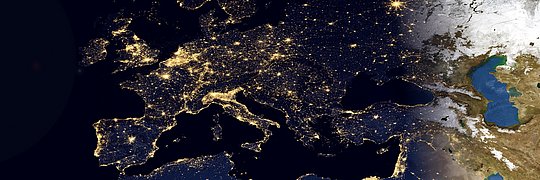
How can space travel drive the energy transition?
Space still plays an underestimated role in the transformation of the energy system in Germany. Dr Eva Schmid, Head of H2 & synthetic energy sources, explains why this should change.
Space can boost the energy transition's value chains
Satellite-based services in the fields of earth and weather observation, navigation and secure communication are already indispensable for the efficient and secure supply of renewable energies. In addition to utilising data from small, specific or even their own satellites, the European space institutions already provide a range of data for free use, for example from the Galileo (navigation and time stamps) and Copernicus (numerous earth observation instruments) satellite families.
However, the potential of space travel extends far beyond the current status quo, along the entire value chain: From project planning to logistics during construction, operation, maintenance and protection. Optimised space applications can make the energy transition more cost-effective, more sustainable and safer. Examples of this include the more efficient identification of areas with favourable wind and solar potential for project developers, the optimisation of deployment planning for renewable energy systems, decisive advantages in the maintenance and servicing of systems such as vegetation management along power lines or railway lines, or the measurement and monitoring of emissions such as methane. Further applications of space solutions in the energy sector are presented by the European Space Agency here.
The German government also recognises the potential of space travel and has formulated the goal of promoting the use and applicability of satellite data for the energy transition in its space strategy.

Space travel in transition: Falling costs bring new opportunities
The space industry has changed significantly in recent years due to its commercialisation and the cost of launching satellites into Earth orbit has fallen considerably. Today, prices of less than €2000/kg are in competition - compared to a long-term average of around €20-30,000/kg (Source).
Lower costs and rapid developments in the intelligent use of data are creating numerous economic opportunities for using satellite data to optimise energy transition processes.
Why now is an important time to capitalise on the opportunities of space applications
The opportunities offered by space applications do not only represent a competitive advantage for the optimised processes of the energy transition. Europe needs sovereign and economic access to space and a competitive space economy in order to remain geo-economically and geopolitically viable.
A large part of the global market for rocket launches is currently dominated by the US provider Space Exploration Technologies (SpaceX). In the first three quarters of 2024, Space Exploration Technologies (SpaceX) accounted for 94 of 152 rocket launches, while only 2 were carried out by the European ArianeGroup (Source).
This development emphasises the urgent need to strengthen European competitiveness in the space sector. Europe is already a leader in the field of earth observation satellites and, with Galileo, also has an internationally competitive navigation system. It is important that awareness of the fundamental relevance of space for our data-based economy increases and that the corresponding investment decisions are made to strengthen sovereign space. Let's start by making better use of the services of space travel for the energy transition.